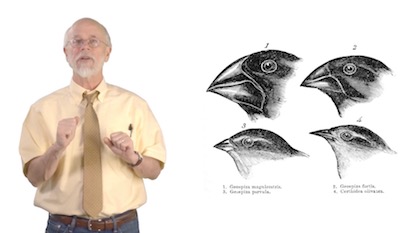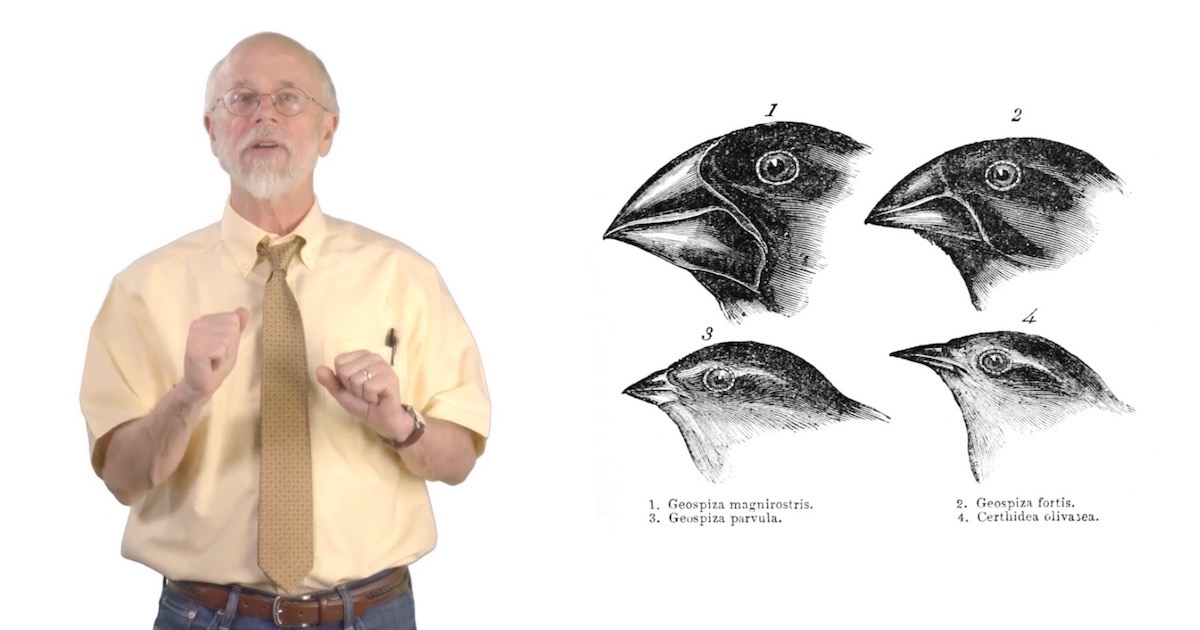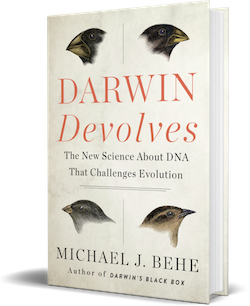 Evolution
Evolution
 Intelligent Design
Intelligent Design
Behe’s New Video Course — No Spoilers Here


In case you missed the earlier announcements, one of intelligent design’s founding fathers — Michael Behe — has just announced his third book advancing the design argument. It’s available as a pre-order now, which includes some very cool free bonuses.

The book is Darwin Devolves: The New Science About DNA That Challenges Evolution. See Brian Miller’s comments, “Michael Behe’s Darwin Devolves Topples Foundational Claim of Evolutionary Theory.” Given the waves created by Behe’s previous books — Darwin’s Black Box (1996) and The Edge of Evolution (2007) — there is a lot of excitement about this latest, set to release on February 19 by HarperOne. Just as exciting is the release of a new instructional video course on intelligent design, presented entirely by Behe himself. Free, immediate access is one of the bonuses you get when you pre-order.
This 41-session course, complete with self-grading quizzes, retails for $49.95 — which is quite a deal, in itself! For a limited time, though, the Center for Science & Culture is offering it without charge as an incentive. Pre-order Darwin Devolves now for $18.89, at 35 percent off the cover price, and you’ll receive access to Behe’s complete video course. But there’s more: you’ll also receive a free exclusive extra chapter of Darwin Devolves, and free access to a private, national conference call with the author himself.
In case it doesn’t sell itself (c’mon, what’s not to like?), let me share a bit about this new video course, as I near completion of it myself.
An Argument Evolves
I was introduced to formal design perspectives in biology when I read Darwin’s Black Box. As a high school student, already bound for a degree in the biological sciences, I felt I had discovered a true friend and comrade in Dr. Behe. Surrounded by neo-Darwinian perspectives in my textbooks, classrooms, and the media, I appreciated this accomplished scientist who saw the abundant evidence for design and purpose exhibited lavishly throughout the natural world. Even without the expertise of Dr. Behe, a professor of biochemistry at Lehigh University, I had studied enough to be convinced of the failure of “chance” explanations for biology’s wonders, and to be filled with awe at the intricate machinery and beauty of life.
Since then, Behe’s case for design has deepened. In the new video lecture series, it is presented colorfully and with countless historical and scientific anecdotes. Watching the course, I’ve found his passion for biochemical research, and his intellectual integrity, to be persuasive and refreshing.
Darwin’s Black Box introduced the term “irreducible complexity,” which now finds its way into almost every conversation on intelligent design in the life sciences. As a sort of poster child for irreducible complexity, the bacterial flagellum was described in detail and compared to an outboard motor. This molecular machine contains similar components (such as a rotor, stator, and bearings) and accomplishes a similar function (locomotion through an aqueous environment). Along with other arguments in the book, irreducible complexity built a strong case for a new view in biology — one that challenges the ability of random mutations and natural selection to accomplish the vast biological diversity we observe throughout the planet.
Evolution’s Edge
About a decade later there was The Edge of Evolution. Using fresh evidence from molecular biology, including the discovery of irreducibly complex gene regulatory networks (GRNs), Behe argued that the mechanisms responsible for evolution lacked sufficient power to diversify organisms beyond the taxonomic level of class. Since different GRNs are required for different body plans, that is, different ways of organizing the body, as well as for some specialized cell types, it follows that each class — from mosses to mollusks — requires unique design specifications. For example, certain classes of mollusks depend on specific cells to secrete the proteins, chitins, and other components that make up the shell. These unique genes and proteins are often taxonomically restricted, that is to say, not present in other taxa. Indeed, some appear to be species-specific! Through chance processes of variation alone, these can be altered only to a limited degree. Behe dubbed this limit the “edge of evolution.”
In the past decade, available molecular data have increased by orders of magnitude. Not surprisingly, then, Behe’s case has, in a manner of speaking, continued to evolve. This is the nature of scientific research, after all. Honest scientists are always testing their current hypotheses against new data. The very latest evidence is presented in Darwin’s Devolves.
No Spoilers Here
In the last decade, studies involving species of Galápagos finches, African cichlids, and Hawaiian flora and fauna — just to name a few — have consistently shown something remarkable. What’s that? Well, I am not going to spoil the surprise for you. Let’s just say that Behe’s latest work has further refined his edge of evolution, in a highly significant way. Whatever your own views may be, you will want to hear the arguments for yourself in this engaging video series, complete with numerous references and analogies to ensure that all is clear.
Intrigued? If you can’t wait till February 19 to get your copy of Darwin Devolves, then you’ll definitely want to pre-order now and start enjoying the full course immediately. The special offer also makes an affordable and valuable holiday gift for a student, teacher, or anyone interested in pursuing the ultimate question of biological origins.
